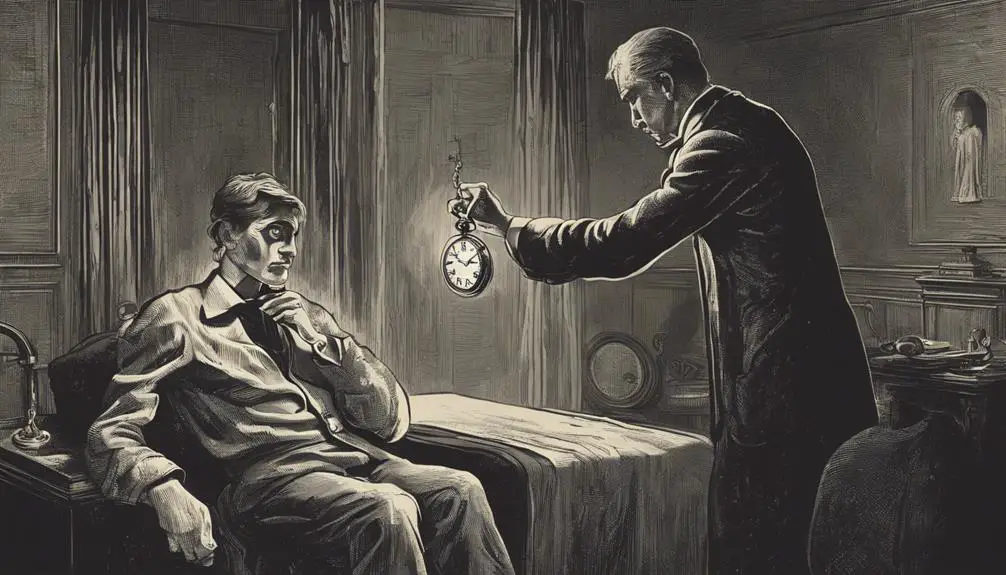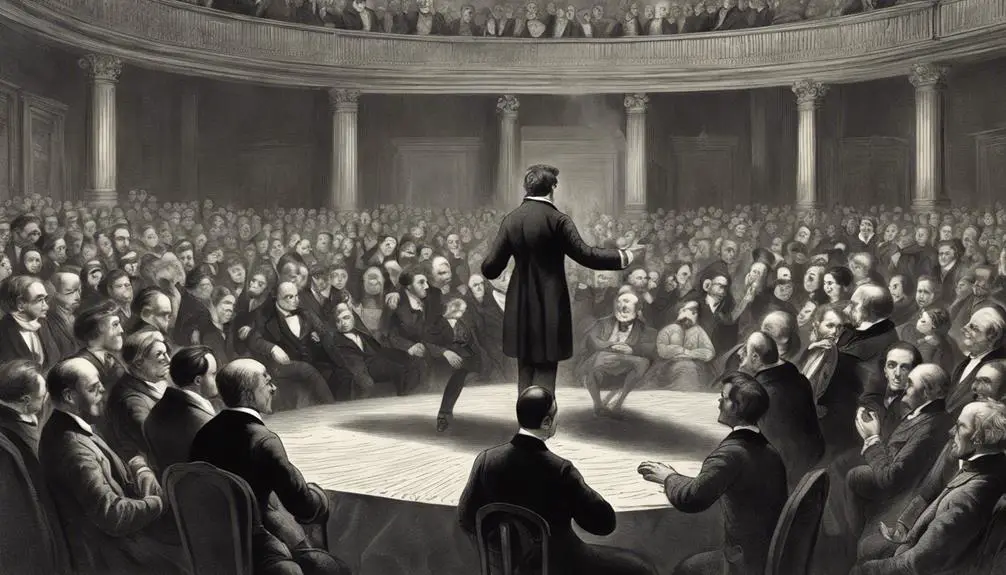Hypnosis
Understanding the Historical Impact of Hypnosis
The historical impact of hypnosis can be traced back to ancient civilizations where altered states of consciousness were induced for therapeutic purposes, laying the foundation for its evolution. In the 18th century, Franz Mesmer's work with animal magnetism led to the scientific exploration of inducing trance-like states. By the 19th century, hypnosis transitioned from spiritual healing to mainstream medical practices. Sigmund Freud's experiences with hypnosis influenced modern psychology and psychotherapy. Today, hypnosis therapy is used for managing various conditions, from anxiety to addiction, showcasing its versatility and ongoing relevance in addressing psychological and physiological challenges.
Early Beginnings of Hypnosis

During antiquity, various cultures explored altered states of consciousness and the power of suggestion, laying the foundational groundwork for what would later be recognized as hypnosis.
The concept of inducing trance states and utilizing hypnotic induction techniques for therapeutic purposes dates back centuries. Ancient civilizations such as the Egyptians, Greeks, and Romans practiced rituals that involved altered consciousness, suggesting a primitive form of hypnosis.
Hypnosis as therapy has been documented throughout history, with medical benefits recognized in fields such as pain management, psychological disorders, and even surgical procedures. The utilization of hypnosis for medical purposes can be traced back to ancient healing temples where priests would induce trance-like states to help individuals alleviate symptoms or gain insights into their ailments.
These early beginnings highlight the enduring fascination humans have had with altered states of consciousness and the potential therapeutic applications of hypnosis.
As history progressed, these foundations evolved, leading to the more structured and scientifically studied hypnosis techniques we know today.
Mesmerism and Animal Magnetism
Mesmerism and Animal Magnetism emerged as significant phenomena in the historical development of hypnotic practices, marking a pivotal transition towards more structured and systematic approaches to inducing altered states of consciousness for therapeutic purposes.
Franz Mesmer, an Austrian physician, introduced the concept of animal magnetism in the 18th century, suggesting that an invisible force could influence health. Mesmer believed that this force could be channeled to promote healing, a practice known as magnetic healing. He conducted sessions where he would use magnets and his hands to induce trance-like states in patients, aiming to rebalance their animal magnetism and restore health.
Mesmer's techniques involved passes over the body, leading to what was termed 'mesmerizing' patients. While Mesmerism was eventually discredited due to its mystical elements, its focus on inducing altered states of consciousness paved the way for the more scientifically-grounded approaches to hypnosis that would emerge in the 19th century.
Hypnosis in the 19th Century

In the 19th century, the practice of hypnosis underwent significant evolution and refinement, as researchers and practitioners sought to understand its mechanisms and potential applications more deeply. During this time, hypnosis was increasingly associated with spiritual healing practices. It was believed that through hypnosis, individuals could access altered states of consciousness that facilitated physical and emotional healing processes.
Public demonstrations of hypnosis also became more prevalent in the 19th century, with practitioners showcasing the power of suggestion and trance-like states to captivated audiences.
The 19th century saw a shift towards a more scientific understanding of hypnosis, moving away from the mystical connotations of mesmerism and animal magnetism. Scholars and physicians began to explore hypnosis as a tool for psychological inquiry and therapeutic interventions. This period laid the groundwork for the more systematic study of hypnosis that would come in the following centuries, setting the stage for its integration into mainstream medicine and psychology.
Sigmund Freud and Hypnosis
The relationship between Sigmund Freud and hypnosis played a significant role in the development of psychoanalysis and the understanding of subconscious processes. Freud initially trained in hypnosis under Jean-Martin Charcot in Paris. While Freud later moved away from hypnosis as a primary therapeutic technique, its influence on his work and the development of psychoanalytic theory is undeniable.
Freud's experiences with hypnosis led him to develop key concepts within psychoanalysis. For instance, the idea of the unconscious mind, which became a cornerstone of Freudian theory, can be traced back to his observations during hypnosis sessions. Freud's exploration of repressed memories and the role of the subconscious in shaping behavior were also influenced by his early work with hypnosis.
Although Freud eventually shifted towards using free association and dream analysis instead of hypnosis, the Freudian influence on modern psychology and psychotherapy continues to be profound. The legacy of his work with hypnosis can be seen in the emphasis on exploring hidden motivations and unresolved conflicts within the psyche, a fundamental aspect of psychoanalytic theory.
Hypnosis in Modern Psychology

Hypnosis continues to be a subject of interest and research in modern psychology, with applications ranging from clinical therapy to studying consciousness and suggestibility.
In hypnosis therapy, a trained therapist induces a state of focused attention and heightened suggestibility in the patient. This altered state of consciousness allows for increased openness to therapeutic suggestions, making it a valuable tool in treating various conditions such as anxiety, phobias, and even chronic pain.
Research on hypnotic suggestibility has shown that individuals vary in their responsiveness to hypnotic inductions, with some being highly susceptible and others less so. Understanding these individual differences in suggestibility is crucial in tailoring hypnosis interventions to maximize therapeutic outcomes.
Moreover, modern psychological studies continue to explore the underlying mechanisms of hypnosis, shedding light on how it affects cognitive processes, brain activity, and perception.
Contemporary Applications of Hypnosis
Contemporary research has identified diverse applications of hypnosis in fields ranging from healthcare to performance enhancement.
Hypnosis is increasingly recognized for its therapeutic benefits in various clinical settings. Studies have shown its clinical effectiveness in managing pain, anxiety, and stress-related disorders. In healthcare, hypnosis is utilized as an adjunct therapy to alleviate symptoms in conditions such as chronic pain, irritable bowel syndrome, and insomnia.
Moreover, hypnosis is being integrated into psychotherapy to enhance treatment outcomes for phobias, post-traumatic stress disorder, and addiction.
Beyond healthcare, hypnosis is also employed in performance enhancement contexts, such as sports and public speaking. Athletes use hypnosis to improve focus, motivation, and confidence, while professionals seek it to overcome performance anxiety and boost self-assurance.
The application of hypnosis in these diverse fields underscores its versatility and potential to address a wide range of psychological and physiological challenges. As ongoing research continues to explore the mechanisms underlying hypnosis, its contemporary applications are expected to expand further, offering new avenues for therapeutic intervention and personal development.
Frequently Asked Questions
Can Hypnosis Erase Memories?
Memory manipulation through hypnosis raises ethical concerns due to its potential impact on individuals' autonomy and well-being. While some claim memories can be erased, scientific evidence remains inconclusive. Further research is needed to clarify this phenomenon.
Is Hypnosis Dangerous?
When evaluating the safety of hypnosis, ethical considerations must be prioritized. Despite misconceptions, when conducted by trained professionals, hypnosis can offer potential benefits in various clinical applications. Understanding its limitations and following best practices are crucial.
Can Anyone Be Hypnotized?
Hypnosis acceptance varies among individuals due to differences in susceptibility. While most people can be hypnotized to some extent, the depth and effectiveness of hypnosis may differ based on factors like suggestibility, focus, and relaxation levels.
Does Hypnosis Work for Everyone?
Individual differences play a significant role in the effectiveness of hypnosis. While it can be successful for many, skepticism and misconceptions about its universal applicability exist. Research suggests that not everyone may respond to hypnosis in the same way.
Can Hypnosis Help With Physical Pain?
Hypnosis is increasingly recognized as a valuable tool in pain management. Research suggests that it can be an effective alternative therapy for alleviating physical pain by influencing perception and response to discomfort, offering potential relief for many individuals.
Conclusion
In conclusion, the historical impact of hypnosis has been significant, with its origins tracing back to ancient civilizations and evolving through various movements such as mesmerism and animal magnetism.
In the 19th century, hypnosis gained recognition as a therapeutic tool, influencing the work of influential figures like Sigmund Freud.
Today, hypnosis continues to be utilized in modern psychology for a variety of purposes, demonstrating its enduring relevance and effectiveness in the field of mental health.
